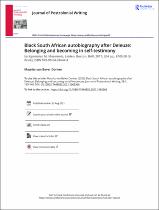Black South African autobiography after Deleuze: Belonging and becoming in self-testimony
Abstract
4Kgomotso Masemola’s Black South African Autobiography after Deleuze is a study in the practice of reading in post-apartheid South Africa. Far from offering a sense of black writing as becoming modern through a mimicry of what might be called the non-African or foreign, Masemola gives us a nuanced reading of how South African autobiography (including authors such as Peter Abrahams, Es’kia Mphalele, N. Chabani Manganyi, Miriam Makeba, Bloke Modisane, Ellen Kuzwayo, Sindiwe Magona, Nelson Mandela, and Mamphela Ramphele) reads in a broader context. This is an intervention that deserves to be engaged with not only for its deft and lucid articulation of “theory”, but also for its strong literary sensibility. In Masemola’s intervention, the book is not an image of the world but rather a rhizomatic line charted through chaos. This Deleuzian insight is paired with a postcolonial tone borrowed from Homi Bhabha, which fundamentally alters the key terms of his text: the reader very quickly realizes that neither the adjective “black”, nor the proper noun “South Africa”, is straightforwardly accessible.

